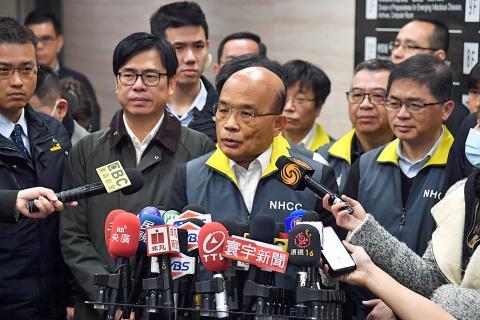The Executive Yuan yesterday urged Beijing to accept the nation’s request to evacuate about 300 Taiwanese stranded in Wuhan, China, after the city was locked down because of a coronavirus outbreak.
Executive Yuan spokeswoman Kolas Yotaka said that the Mainland Affairs Council and the Straits Exchange Foundation have so far received more than 200 telephone calls from Taiwanese barred from leaving Wuhan, requesting the government’s assistance in returning home.
The council has informed Beijing that it wants to charter a flight to evacuate Taiwanese in Wuhan, Kolas said, adding that the council was making the request out of humanitarian considerations.

Photo: CNA
So far, China has yet to agree to this arrangement, she added.
“We urge Beijing to refrain from making a decision on this matter based on political considerations,” she said.
The Taiwanese stranded in Wuhan are not businesspeople living in the city, but had traveled there for business trips or short tours, she said, adding that they are not being “properly looked after” as China’s Taiwan Affairs Office has claimed.
“We hope that Beijing will seriously consider our request to bring our compatriots back using a charter flight, considering that some of them have chronic diseases,” she said.
Taiwan Affairs Office spokesman Ma Xiaoguang (馬曉光) said in a statement on Tuesday that, as of Monday it had not received any reports from its branch in Hubei Province — of which Wuhan is the capital — of any Taiwanese having contracted the virus.
He said that its staff members in Hubei have cared for the needs of Taiwanese in Wuhan and have instantly resolved their problems in accordance with its policy to contain the viral outbreak.
Ma said that China’s Association for Relations Across the Taiwan Straits had received a request to evacuate Taiwanese from the Straits Exchange Foundation at 6pm on Monday, but denied that the two sides were negotiating any kind of arrangement.
“We have been deeply concerned about the welfare and health of our Taiwanese compatriots since we began our work of curbing the spread of the viral pneumonia and have been in close contact with relevant authorities in Taiwan,” he said.
“We will arrange for Taiwanese experts to arrive in Wuhan to observe the situation and offer instant updates on the situation,” Ma added.
However, Premier Su Tseng-chang (蘇貞昌) said that the foundation has been trying to contact its counterpart in China as the government is very concerned about the well-being of Taiwanese in Wuhan.
“[From the statement] we can see that China does not contact us directly, but has said publicly that it would look into the situation and care for [Taiwanese]. We will keep trying to communicate” with China, Su said.

CROSS-STRAIT COLLABORATION: The new KMT chairwoman expressed interest in meeting the Chinese president from the start, but she’ll have to pay to get in Beijing allegedly agreed to let Chinese Nationalist Party (KMT) Chairwoman Cheng Li-wun (鄭麗文) meet with Chinese President Xi Jinping (習近平) around the Lunar New Year holiday next year on three conditions, including that the KMT block Taiwan’s arms purchases, a source said yesterday. Cheng has expressed interest in meeting Xi since she won the KMT’s chairmanship election in October. A source, speaking on condition of anonymity, said a consensus on a meeting was allegedly reached after two KMT vice chairmen visited China’s Taiwan Affairs Office Director Song Tao (宋濤) in China last month. Beijing allegedly gave the KMT three conditions it had to

STAYING ALERT: China this week deployed its largest maritime show of force to date in the region, prompting concern in Taipei and Tokyo, which Beijing has brushed off Deterring conflict over Taiwan is a priority, the White House said in its National Security Strategy published yesterday, which also called on Japan and South Korea to increase their defense spending to help protect the first island chain. Taiwan is strategically positioned between Northeast and Southeast Asia, and provides direct access to the second island chain, with one-third of global shipping passing through the South China Sea, the report said. Given the implications for the US economy, along with Taiwan’s dominance in semiconductors, “deterring a conflict over Taiwan, ideally by preserving military overmatch, is a priority,” it said. However, the strategy also reiterated

‘BALANCE OF POWER’: Hegseth said that the US did not want to ‘strangle’ China, but to ensure that none of Washington’s allies would be vulnerable to military aggression Washington has no intention of changing the “status quo” in the Taiwan Strait, US Secretary of Defense Pete Hegseth said on Saturday, adding that one of the US military’s main priorities is to deter China “through strength, not through confrontation.” Speaking at the annual Reagan National Defense Forum in Simi Valley, California, Hegseth outlined the US Department of Defense’s priorities under US President Donald Trump. “First, defending the US homeland and our hemisphere. Second, deterring China through strength, not confrontation. Third, increased burden sharing for us, allies and partners. And fourth, supercharging the US defense industrial base,” he said. US-China relations under

The Chien Feng IV (勁蜂, Mighty Hornet) loitering munition is on track to enter flight tests next month in connection with potential adoption by Taiwanese and US armed forces, a government source said yesterday. The kamikaze drone, which boasts a range of 1,000km, debuted at the Taipei Aerospace and Defense Technology Exhibition in September, the official said on condition of anonymity. The Chungshan Institute of Science and Technology and US-based Kratos Defense jointly developed the platform by leveraging the engine and airframe of the latter’s MQM-178 Firejet target drone, they said. The uncrewed aerial vehicle is designed to utilize an artificial intelligence computer